
Louisiana is solidly Republican and is not a swing state, but it should be front and center in every political discussion in this important election year. Louisiana ranks fourth in crude oil production, and 2 percent of U.S. oil reserves are located in her waterways. The state's natural gas reserves account for about 5 percent of the U.S. total, and it is the port of entry and exit for the largest inland shipping waterway in the United States. Commerce and the economy from Minneapolis to New Orleans rises and falls upon the Mississippi River infrastructure, tariffs, and value added taxes.
 Polls show Louisiana still solidly in the red column, even with Obama's recent surge in national polls. Louisiana has a popular incumbent Democratic senator in Mary Landrieu who has come out enthusiastically for Obama now that she is solidly ahead in her own reelection bid. Her opponent, state Senator John Kennedy, ran as a Democrat in 2004 and lost to Republican David Vitter, who was recently involved in a sex scandal. This is Huey Long country after all, and politics can be as crazy as Mardi Gras.
Polls show Louisiana still solidly in the red column, even with Obama's recent surge in national polls. Louisiana has a popular incumbent Democratic senator in Mary Landrieu who has come out enthusiastically for Obama now that she is solidly ahead in her own reelection bid. Her opponent, state Senator John Kennedy, ran as a Democrat in 2004 and lost to Republican David Vitter, who was recently involved in a sex scandal. This is Huey Long country after all, and politics can be as crazy as Mardi Gras.
That's the thumbnail political/economic sketch.
The human sketch is surprising, sad, and begs many questions that the candidates should answer, noting Louisiana's importance to the US economy and how the local population supports an infrastructure that impacts the rest of the country. Consider the fact that Louisiana is ranked number 42 in per capita income in the United States, and 19.2 percent of Louisiana's population lives below the poverty line, and the reasons why someone should care about Louisiana become more compelling.
Newly elected Republican Governor, Bobby Jindal, who some see as future presidential timber, is at the helm of state government. It is highly unlikely that candidates will make appearances down here in the final two weeks of the election, even though many parts of the state are still reeling from the after effects of Hurricanes Gustav and Ike, and crashing oil prices are putting a damper on rosy predictions for budget surpluses.
Governor Jindal admits a one billion dollar budget shortfall is inevitable next year, but does not seem worried. He says now that he won't raise taxes. Perhaps it is because oil continues to flow like never before in Cajun country. The oil and gas industry is booming and "millionaires are being made overnight," according to Dr. Loren C. Scott president of Loren C. Scott and Associates, an economic consulting firm. (Source: Tri Parish Times, October 8, 2008)
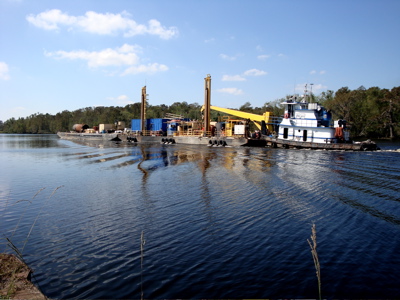
Image: Oil infrastructure heading up the Atchafalaya
The New Orleans Times Picayune senses something in the winds, and it is not just the smell of the petrochemical plants. The paper reported Tuesday the fact that "in recent weeks, just as the financial crunch has slowed business on a global scale, the state appears to have tipped toward a decline on key indicators, creating an unclear and perhaps gloomy forecast for Louisiana commerce and government."
Falling oil prices in a state where each dollar paid per barrel equates to $12 million dollars can wreck a budget in a hurry. Louisiana counts on severance taxes and royalties from oil and gas production on its turf. There are other shortfalls as well. Jindal's budget advisor, Angele Davis, told the press this week that corporate income tax has declined for the first time in five years and personal income tax has fallen for the first time in 20 years.
Louisiana is America's third largest producer of petroleum and also leads in petroleum refining. You will find the largest concentration of crude oil refineries, natural gas processing plants and petrochemical production plants in the entire Western hemisphere here. Louisiana supplies twenty five percent of the US supply of natural gas. Port Fourchon in Terrebonne Parish serves over 90 percent of the Gulf's oil production activity.
Go over any bridge from New Orleans to Lake Charles after dark and this fact is brought home with the orange glow of gas vents painting the night sky a sickly hue, blotting out the stars, and creating a huge carbon footprint. Louisiana is America's second largest producer of natural gas, supplying more than one-quarter of the total U.S. production. Louisiana pioneered the techniques of offshore drilling and the oil companies ruined the protective barrier of the wetlands in the process.
Speaking of wetlands, because of its bays and sounds, Louisiana has the longest coastline (15,000 miles) of any state and 41 percent of the nation's wetland -- or it used to before the last three years of hurricanes, beginning with Katrina and ending with Ike.
Louisiana leads in sugar cane production and petrochemicals. Louisiana is also home to "cancer alley," the geographical corridor between Baton Rouge, New Orleans and the Delta Parishes (counties). You will find clusters of the rarest childhood cancers here, as well as epidemics of lung cancer and spikes in childhood asthma during sugar cane burning season.
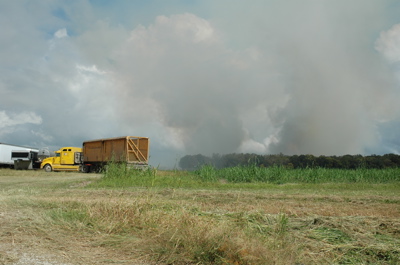
Image: Burnin' the cane outside Thibodaux
Louisiana's commercial fishing industry produces 25 percent of all the seafood in America. More shrimp are caught in Louisiana waters than in any other place in America, but the industry is in deep trouble because of foreign imports of cheaper farm raised shrimp, and the imports are full of pollutants according to some studies.
The standard of living in some areas compares with third world countries. You don't need a study to prove this. Just drive around.
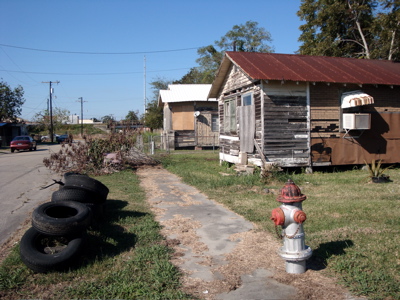
Image: Neighborhood within 2 blocks of billion dollar ocean industry
This week George Bush was in Alexandria with the Central Louisiana Chamber of Commerce saying "I have heard that people's attitudes are beginning to change from a period of intense concerns --- I would call it near panic --- to being more relaxed," he said.
Chamber President Elton Pody was "impressed" that Bush took notes at the meeting, which he later folded up and put in his coat pocket, according to a report published on an Alexandria blog, Bush also said that without prayers and Christian guidance, he wouldn't know where he would be. He said that he was "sure the Lord would never give him more than he could handle."
One wonders if the same can be said of the poor and dispossessed of Louisiana. The oil machine is humming and perhaps that is why the national press ignores compelling social and economic issues, and no pressure is put on the candidates to comment specifically on how to fix our national energy policy.
Some may shrug and say, "well this is the deep south after all," still under the Napoleonic Rule of Law. That is a common misconception. It is incorrect to equate the Louisiana Civil Code with the Napoleonic Code but it is a regular occurrence.
Louisiana is the place where back bayous run deep and mysterious, home of filming for the Tarzan movies and creepy horror films. Holy Cajun healers practice here, and so do Voodoo priests and priestesses in a largely Protestant religious landscape.
Cajuns and Creoles, descendants of French-speaking Acadians from colonial French Acadia, populate the Delta region. They are the remnants of the great American Diaspora celebrated in Longfellow's Evangeline.

Driven out of Nova Scotia for refusing to pledge allegiance to British rule, the Acadian "migration" can be called a genocide and descendants are still paying the price. The cemeteries are hauntingly beautiful and Evangeline lives in memory in St. Martinsville as if she were real. Some believe that she was.
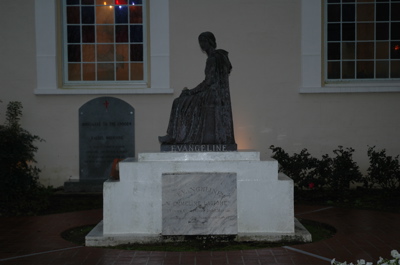
Evangeline's memory gives hope to a vanishing culture and lifestyle, where until recently, English was considered a second language in some areas.
Louisiana residents are experiencing a huge disconnect between what the politicians and industry experts are saying and the personal realities of their livelihoods. Louisiana lost 1,700 manufacturing jobs from August 2007 to August 2008.
Since the hurricanes of 2005-08, a large part of the labor force has left. No one knows for certain, but New Orleans seems to be short about 200,000 people since Katrina, most of them poor and reliably Democratic voters who have moved on. FEMA graft and mismanagement is an on-going story and no longer surprising or newsworthy.
General Motors recently laid off almost 800 employees at its Shreveport plant. No surprise there. The plant produces gas guzzling pickups and Hummers --- but if the oil continues to come out of the ground like never before --- producing those overnight millionaires, why lay them off? Is there enough oil, or not?
Other analysts say that the Louisiana economy is outperforming the nation because of oil, hurricane reconstruction, and imports fueled by a weak dollar. Talk to locals and the obvious question is "Where's the money?"
A 49-year-old grocery clerk at a neighborhood market in Morgan City said she has never registered to vote. When asked why, she did not bat an eye, saying, "Why should I? Politicians ain't gonna do nothin' for me baby."
Yeah, everyone here calls you, "baby." I kind of like it --- a comforting greeting for a road warrior.
I ask the clerk about the stories that there aren't enough workers to fill the offshore job openings.
She looks at me like I'm nuts and tells me that her two sons were laid off twice by the oil industry in the last year. They are welders and pipe fitters; just what the industry claims they are looking for. Morgan City has is anchored to the offshore drilling and oceaneering industries. The Morgan City Daily Review recently published a sixteen-page broadsheet supplement featuring three of the companies, Oceaneering, Diamond Services, and Veolia Environmental Services.
Morgan City is also home to "Mr. Charlie," a once cutting-edge offshore drilling rig that is now a training facility for would be roustabouts. Mr. Charlie drilled the first oil well for Shell in the Mississippi River and was kept in service for thirty years, before retiring to its place on the Morgan City waterfront in 1986.
I stopped by the rig museum where Charlie is tethered and class was in session for offshore trainees, so there is truth to the rumor that the jobs are out there.
Still, the money is not reaching the local economy. The neighborhood within shouting distance of Mr. Charlie looks like something out of the Great Depression. A source within the ocean industry responded to my query --- "Where's the oil money?" --- with the admonition that "perhaps the money just stays in the same circles." There is also the consideration that the older labor is unskilled.
Louisiana is also home to Capitol city Baton Rouge, named as "one of the best places to ride out the coming recession," by Business Week. "Gulf Opportunity Zone incentives following the 2005 hurricane season definitely have insulated Baton Rouge and New Orleans from the national financial downturn," Business Week said. I am wondering how this can be true.
So, is it possible to separate economic fact from fiction in Louisiana?
Editor/publisher Steve Shirley of the Morgan City Daily Review (circulation 5,597) sat down with OfftheBus for a good two hours and offered a regional tutorial. Shirley still runs his newspaper the old-fashioned way and prints the broadsheet in the back room on a mammoth Goss press. The Internet newspaper meets with a "real" newspaper guy. It's the local guys who understand their community best and Shirley is passionate about Louisiana. He's lived in the area for 35 years and hails from Spartanburg, SC, a southern boy, through and through.
Pale blue eyes flashing behind gold-rimmed glasses, Shirley moves his arms up and down as he illustrates Louisiana's economic fortunes in relation to the price of oil. Responding to a question about the seeming inequity of Louisiana's dismal place ranking in per capita income, Shirley is quick to respond that it was not always so.
"In the 1970's Louisiana was in the top five ranking for everything. The crash happened in the eighties when all of the white-collar jobs left and went to Houston. Mobile, Texaco and Shell, they all just left," Shirley said while his eyes conveyed deep frustration that it happened at all.
"After that we lost the blue collar coattail industries like Halliburton and Brown and Root. They all lost touch, keeping field offices open, but only the grunts stayed while the bosses left."
Shirley emphasizes that oil is booming. "Offshore is going and blowing like never before," he said.
Does he think McCain and Obama understand the economics of oil?
"What we need is a guy who can stop the US energy patch (oil producing capability) from being cyclical."
"So, the cry down here would be 'drill, baby, drill?'"
The blue eyes stare me down.
"Well, we are all for energy independence, I can tell you that," Shirley says. "Nobody will disagree, it rings the cash register, although I might want to change the slogan to 'Give us more of the royalties.'"
"In the seventies, when we were importing 25-30 percent of our oil, we were caught with our pants down. It was as crazy then as it is now. For two months after Ike, you had a hard time finding gas in the southeast."
Shirley leans back in his chair and reflects for a moment. My eyes drift to the crawl on the muted television, perched on a double set of file cabinets, tuned to CNN, and focused on the candidates out on the campaign trail. The editor stretches and gets me refocused and back to business.
"The most important thing Louisiana needs right now is a national energy policy. We have to take the roller coaster out of the economy here and learn to live within the reality of what we can do. We need the same economic protections and scale as corn producers. OPEC could put us in a real economic tailspin --- all we would need would be another terrorist attack. Fuel is volatile by its nature --- the energy market is volatile in a whole other way."
Shirley fidgets and stretches again. He is clearly frustrated, but it is not with the conversation.
"I don't think either Obama or McCain has a clue what to do about energy. America is in a serious leadership vacuum," he says.
"The little people like Joe the Plumber have no real influence on national politics. The pollsters tell the politicians what to say, but they won't deliver on the promises."
I wonder silently what "Horace the Roustabout" would have to say.
Driving through the dilapidated neighborhood just steps away from a billion dollar infrastructure, I spy Rose's Café. The sign says "open," so I park my car on the otherwise deserted street and try the front door, hoping for a cold one and conversation on a hot afternoon. A newer Dodge Ram Hemi cruises by slowly and the driver looks at me and then averts his gaze.
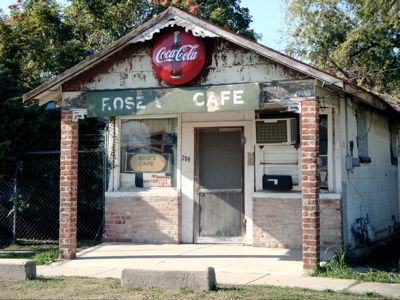
Bummer. A padlock ends my plans.
I regroup and decide to take a second drive out to see the decommissioned Mr. Charlie.
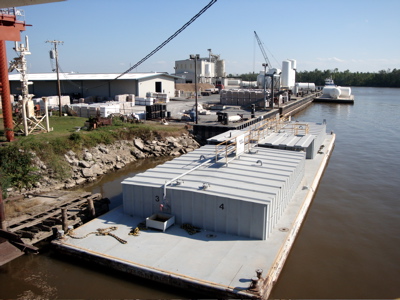
Image: View of barge from Mr. Charlie
Mr. Charlie becomes a distraction from my worry, and while no one is watching I climb to the top of the rig and look out across the waterway which holds the key to a nation's economic security, at least for the foreseeable future.
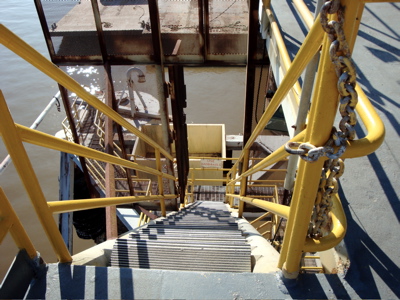
It feels romantic and nostalgic to be up here, alone, on Mr. Charlie. How many million gallons of crude were pumped through this infrastructure back in the day? I pull the notebook out of my back jean pocket and make a note to call someone with the question. One last look around and I bound down the steps, the height producing intoxication, and walk across the grass parking lot to my car. Turning around for one last look, I see that Mr. Charlie is not alone; an ancient tow vessel the "Clipper Patricia" is lashed to his side like a lover. The stories they could tell.
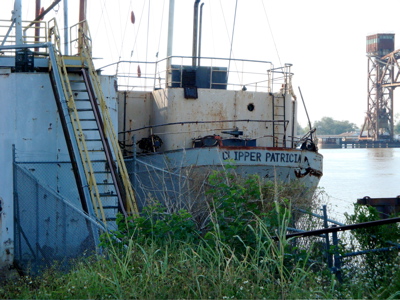
Oil will come into play later, but next up is a look at sugar, how it figures into the ethanol debate, and how "cane" has been both a blessing and a curse to the bayou country since slavery.
If only the candidates were interested in the story of Louisiana as well. It is a fantastic story and it is a wonder that the Delta is not crawling with writers and politicians

